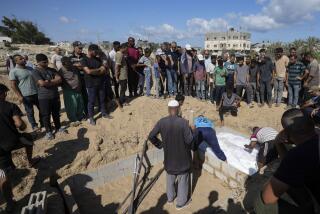Albanians Defy Serbs to Bury Their Dead
- Share via
CIREZ, Yugoslavia — In a show of mass defiance, more than 30,000 ethnic Albanians evaded Serbian roadblocks Tuesday to attend the funeral of two dozen compatriots killed by police in weekend violence.
Mourners in the Albanian-majority province of Kosovo sent Serbian authorities a strong message: Three days of violence have only strengthened their push for independence from Serbian-dominated Yugoslavia, made up of Serbia and the smaller republic of Montenegro.
The burials coincided with reports of a weekend massacre of 11 male members of a family who allegedly were rounded up by Serbian police and executed.
In the harshest U.S. criticism yet of the crackdown on ethnic Albanians, Robert Gelbard, the top American envoy to the Balkans, warned that Yugoslav President Slobodan Milosevic--who controls Serbia--is risking the collapse of his government if the violence does not cease.
The bodies of 24 ethnic Albanians killed over the weekend were buried on a hill in this remote Kosovo village Tuesday. One was buried Monday--an overall death toll that contradicts Serbian officials’ announced toll of 16 dead.
People drove or walked over hills, fields and small rivers to dodge Serbian police and roadblocks set up to prevent them from gathering at the burial site on a broad, grassy hill above the village of Cirez.
The area was the site of a bloody clash between Serbian security forces and local ethnic Albanians over the weekend.
The Serbs say four of their men were killed in an ambush before they moved into Cirez and other neighboring villages to “liquidate 16 terrorists.”
But locals say about 25 ethnic Albanians were killed in a retaliatory Serbian action against unarmed villagers. Human rights officials and Western officials have condemned the police action.
In Washington, the U.S. State Department said Tuesday that it has not ruled out a meeting of big-power foreign ministers to discuss the violence in Kosovo.
Spokesman James P. Rubin declined to say when or where such a meeting of the six-nation Contact Group might take place, but other officials said it could be during a European tour that Secretary of State Madeleine Albright begins Thursday.
The United States, Russia, Britain, France, Italy and Germany are members of the Contact Group, which was originally set up to discuss Bosnia-Herzegovina and meets sporadically to consult on various Balkan issues.
More to Read
Sign up for Essential California
The most important California stories and recommendations in your inbox every morning.
You may occasionally receive promotional content from the Los Angeles Times.













